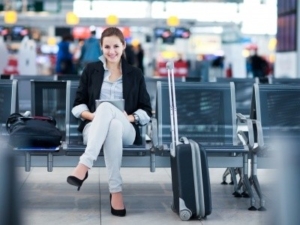 Being on the road can be stressful. Tricks of the trade can minimize projected headaches of travel and keep you cool and collected, like a true professional. Here are some simple life hacks that can speed up and calm down your business travel plans whether domestically or abroad.
Being on the road can be stressful. Tricks of the trade can minimize projected headaches of travel and keep you cool and collected, like a true professional. Here are some simple life hacks that can speed up and calm down your business travel plans whether domestically or abroad.
Tip 1: Download Useful Apps
One of the most targeted apps for business travelers is Worldmate, which combines all your travel booking info (flights, hotels, cars, etc.) to create both business travel and meeting agenda itineraries. The app also aggregates smartphone features such as world clocks, maps, weather info, and both Outlook and LinkedIn options so your itinerary can be shared among colleagues and peers.
Packpoint is a free new packing app that organizes what you need based on travel length, weather, activities and your agenda. It even cross-references which tech gadgets you’ll need for where you’re traveling. Check out this video that displays its capabilities. It even has a ‘business trip’ option for clothes packing. PackPoint “will assemble a list of clothing, toiletries, gadgets, accessories,” and more for your tailored trip.
Fast Company favors the app ahead of Google Now, for example, writing that “a predictive system like Google Now would know your preferences intimately enough just to tell you to remember bike shorts. But PackPoint leverages a relatively spartan interface to learn a whole lot about you and your trip in a very short amount of time.”
Having problems with jet lag? The app Entrain can solve your sleeping habit woes. Developed at the University of Michigan, Entrain is an advanced alarm clock/calculator that allows users to share their sleeping habit data (wake up time, bedtime, time zone and amount of light exposure you are used to receiving. Then a lighting schedule is provided to help prevent or overcome jet lag.
Out of the country and need help converting to the local currency? No problem. The Converted by Ideon app is an all-in-one converter that not only covers your visiting country’s currency but its imperial-metric and conversions., Americans are the only ones still using the Dewey Decimal system and after many hours on a plane, jetlag can interfere with even the most talented mathematicians.
The Converted interface is very slick, and users can drag their converter bars of choice on to their screen, keeping your information private.
In a foreign country and need a quick translation for something like “where’s the bathroom”? iStone can help you in a language jam. It records and translates into 12 languages and carries more than 300 useful phrases in its data arsenal. It also features a native pronunciation feature. Better yet, it is also free and doesn’t require Wi-Fi.
Tip 2: Join loyalty programs
Whichever airline and hotel chain you frequent the most when travelling on business, joining their loyalty and frequent flyer miles programs can save you not only money, but time, and even buy you some convenience in the process.
American Airlines Business Extra program, for example, gives you incentive points for a variety of things, including the ability for your company to earn points for employee benefits with American Airlines, US Airways and US Airways Express, plus earn points on any AA flights operated by British Airways, Japan Airlines and more.
Being on the road can be stressful. Tricks of the trade can minimize projected headaches of travel and keep you cool and collected, like a true professional.
If you fly two trips per month, you and your company will reap some hefty gains. Two flights per month for a year will earn you approximately 2,160 points, including early check-ins, flight upgrades and more.
Delta also has a similar Sky Bonus program that earns your company points each time an employee from the company flies with their airline, or joint venture partners Air France, KLM and Atitalia. The company can redeem by seat upgrades, Sky Club passes and more.
Tip 3: Power Packs, Backups and Outlets
It’s always a good idea to have a handy all-in-one power adaptor, like the Travel Smart by Conair. These models generally utilize the four most common adaptor plugs (grounded and un-grounded) around the globe, covering Europe, Asia, Australia/New Zealand, North/South America, and parts of Africa. It also accommodates European appliances used in the U.S. The all-in-ones also have a surge protector to keep your appliances safe from foreign electricity spikes.
It’s handy to have a portable charger in your pack. Mophie has some great products for phones, such as dock solutions, belt-clips and USB cables. Portable powerstations are also sold to cover every piece of technology you might have, from your laptop to your iPad.
If you have an iPhone, one of the more innovative models Mophie has to offer is the smartphone juice pack battery, which delivers more than 100% extra battery directly to your phone 24/7, and can also double as a protective shell for your device.
As simplistic as they may be, these tips can give a little extra ammo to the savvy traveler, saving you time, money and a little convenience. Happy trails!
By Gina Scanlon
